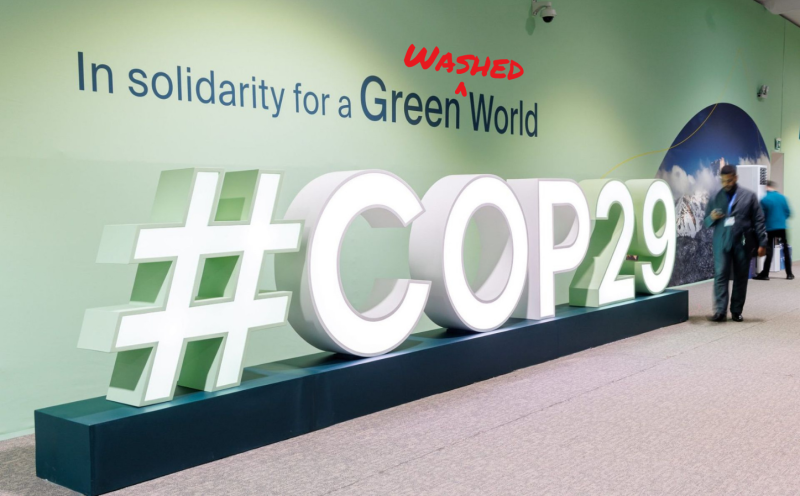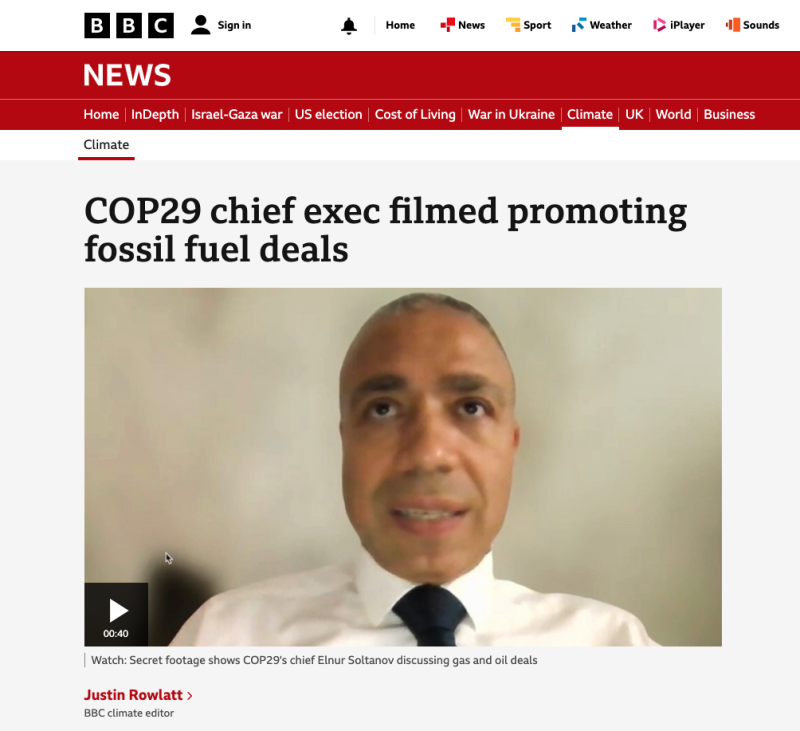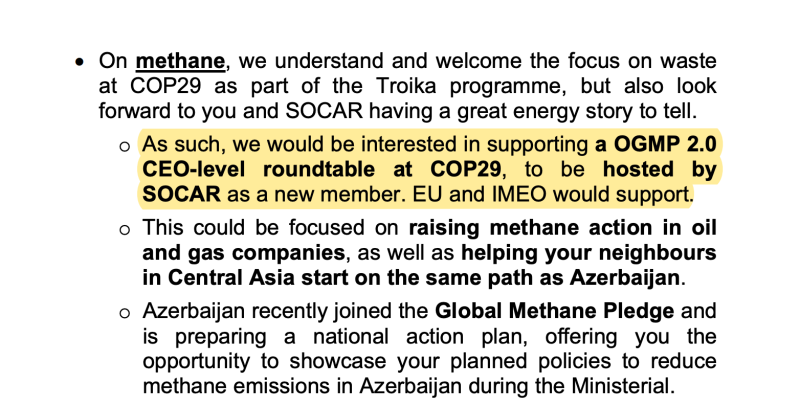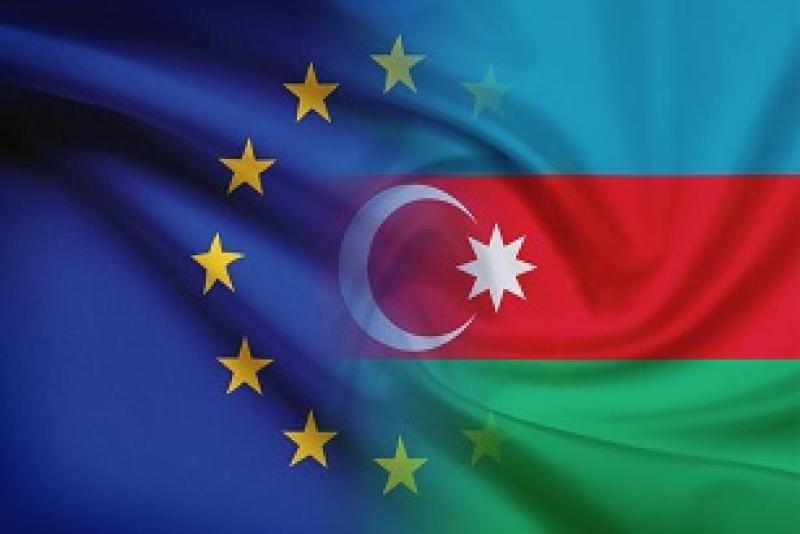Stay always informed
Interested in our articles? Get the latest information and analysis straight to your email. Sign up for our newsletter.

After pressuring Azerbaijan to up gas production for export, the EU is using COP29 to greenwash the fossil fuel and its own climate image. Using not-seen-before documents, we analyse the EU's hypocrisy as its climate goals and upholding human rights are overtaken by energy security demands and greenwashing.
COP29 in Azerbaijan will be dripping in fossil fuels, but not necessarily for all the obvious reasons. Held in a petrostate where 90 per cent of exports are fossil fuels, the story commonly heard from mainstream media and global civil society is that the authoritarian regime plans to increase its gas production by a third over the next decade. COP29 chief executive, Elnur Soltanov, was recently exposed using his role to discuss potential future oil and gas deals. Meanwhile its President, Ilham Aliyev, has called the country’s fossil fuels reserves a “gift of the gods.”
However, we are hearing far less about Aliyev's main customer: the European Union’s member states. While publicly proclaiming its own fossil fuel phase-out, the EU is in fact driving Azerbaijan’s gas expansion – and whitewashing the country's human rights abuses – in the name of domestic energy security. This is the result of seeking alternative sources to Russian gas after the invasion of Ukraine. The EU is trying to justify its hypocrisy by telling the world that Azeri fossil gas can be labelled as “lower emissions”. And what better place to tell that story than at COP29 – if only it could get Azerbaijan to agree.
Using documents obtained by freedom of information requests, Corporate Europe Observatory exposes how the EU successfully lobbied Azerbaijan to join the voluntary Global Methane Pledge (methane is a potent greenhouse gas making up 70-90 per cent of fossil gas), and now plans to use COP29 to showcase its commitment to reducing methane leakages. As a result, the EU can claim its fossil gas imports are “lower emissions” while Soltanov can claim his country produces “sustainable oil and gas”. The EU’s climate HyCOPrisy is all over the UN summit.

Dreaming of Azeri “lower emissions” gas
Fossil gas is primarily made up of methane, which is a potent greenhouse gas more than 80 times worse for global heating than carbon dioxide over a 20 year period. Methane leaks into the atmosphere when drilling, transporting, and storing fossil gas, meaning using it can be as bad for the climate as burning coal – or even worse when it is liquified and shipped.
Research published in 2021 showed that to keep average global temperature rise below 1.5oc, as agreed under the Paris Agreement, the majority of known fossil fuel reserves should be left in the ground. The same year the International Emissions Agency (IEA) said that to meet the Paris Agreement commitments, no new fossil fuel infrastructure should be built. Therefore the EU should not have asked Azerbaijan to double its exports and expand pipeline to Europe, as it did in 2022 following Russia’s invasion of Ukraine.
To square that circle, the EU needed Azerbaijan to join the voluntary Global Methane Pledge and national oil company SOCAR to join its sector-specific Oil and Gas Methane Partnership 2.0 (see Box 1: The Global Methane Pledge). Instead of planning to phase out of gas production, they could instead agree to reduce leakages while increasing production, simply by joining a voluntary scheme dependent on industry self-reporting with no independent oversight. If so, the EU could then label Azeri gas as “lower emissions” and claim it was meeting its climate targets and remaining consistent with the Paris Agreement.
Box 1: The Global Methane Pledge
The European Union and the United States launched the voluntary Global Methane Pledge (GMP) at COP26 in 2021, aiming to reducing methane emissions 30 per cent by 2030 compared to 2020 levels. As of March 2024, 158 countries have signed up. A key element is the Oil and Gas Methane Partnership (OGMP) 2.0, a voluntary self-reporting framework for the industry, which then provides the data to the UNEP-led International Methane Emissions Observatory (IMEO). These are seen as key for implementing the GMP, but have come in for severe criticism.
The International Energy Agency (IEA) has shown how self-reporting has led to vast underestimations of methane emissions, with actual figures 70 per cent higher than official ones. Meanwhile civil society has criticised the IMEO for its dependence on and close links to the oil and gas companies it is supposed to be verifying, as well as a complete lack of transparency that gives even more power to the industry to report whatever it wants, claiming to be stopping leakages while expanding production.
Writing before COP28 in Dubai, the Environmental Investigation Agency said the GMP “is not delivering”, while methane levels in the atmosphere “have continued to rise at unprecedented rates”.
The EU had been lobbying to get Azerbaijan to join the Global Methane Pledge (GMP) since at least 2022, but with no joy. When the two announced they would double the capacity of the controversial Southern Gas Corridor (SGC) mega-pipeline from Baku to Italy,1 European Commission President Ursula von der Leyen said “I strongly encourage Azerbaijan to join [the GMP]”, in order for the EU to be “consistent with our responsibilities on climate”.
By the time Baku was announced as COP29 host in December 2023, things had become more urgent. Imminent EU legislation on methane emissions would require all exporting countries to have similar rules to the EU, so it really needed Azerbaijan and SOCAR to sign up.
Creating a market for lower-emissions gas
At the end of February 2024 the European Commission made a concrete proposal for joint activities at COP29. As well as offering a Ministerial Dialogue on tripling renewables deployment and doubling energy efficiency (agreed at COP28), which appeared part of a broader effort to ‘green’ Azerbaijan’s image, on methane the two “could have a joint leadership story to tell” during the negotiations and could “showcase cooperation and progress... under the Global Methane Pledge framework.” In the pitch, the EU claimed that joining could open up new financial opportunities for Azerbaijan: “The EU aims to establish a global market for lower-emission oil and gas” where those who take action “are rewarded by the market” thanks to importers like the EU choosing who they import from “based on environmental impacts” (see image below).

Anyone reading that document could be forgiven for thinking that the EU was actually incentivising Azeri oil and gas production by claiming it could attract a premium thanks to the GMP. The EU appears to have convinced itself that by joining a voluntary methane pledge based on discredited industry self-reporting to address short-term leakages (see Box 1: The Global Methane Pledge), gas production would become environmentally friendly, and now importing it would line up with global climate targets.
In reality the GMP provides a green sheen for companies like SOCAR, BP, and Italian pipeline operator Snam – all shareholders in the Southern Gas Corridor — while they continue to drill for or transport gas. These companies can use this new-found legitimacy to claim to be part of the solution and have a place at the table, even defining what is and what isn’t a fossil fuel phase-out, and ensuring it doesn’t mean acting today.
Last year’s COP28, which had a record number of fossil fuel lobbyists in attendance, agreed to “transition away from fossil fuels”. But according to ex-EU Energy Commissioner Andris Piebalgs, who has been heavily involved in the EU’s methane plans as well as the International Methane Emissions Observatory (IMEO), that commitment never actually meant stopping production immediately. Rather, it meant that the oil and gas industry should rapidly reduce their methane emissions by tackling leakages.
Up close and personal
A few days after sending the proposal for joint activities, the European Commission continued its lobbying campaign in person at the OGMP 2.0 Annual Implementation Conference in Madrid. Hosted by Spanish oil and gas major Repsol, the conference brought together representatives from more than 125 oil and gas producers alongside national and regional regulators. Documents reveal that the Commission specifically invited someone from Azerbaijan’s Department of Energy (whose name is redacted) to the conference in order to lobby them. Azerbaijan announced its membership of the GMP immediately after the conference. While in Madrid the Commission also worked on SOCAR, whose Vice President was offered “political support” if the company joined OGMP 2.0, as well as proposing COP29 “as a venue to further work on methane”.
Minutes from a call in May 2024 between the Commission and the Deputy Energy Minister Orkhan Zeynalov (who replaced Mukhtar Babayev when he became COP29 President-designate) reveal SOCAR subsequently joined, with the news made public that August.
Take it to the COP
With Azerbaijan and SOCAR joining the GMP and the OGMP 2.0 respectively, part one of the EU’s plan was now complete. The next phase was making COP29 the stage to showcase their “lower-emissions” gas to justify expanding imports.
“Aside from his COP29 role, Babayev is Minister of Ecology, and as such, directly in charge of domestic action on methane”
European Commission briefing prepared for Director General Juul Jørgensen
The European Commission had already identified COP29 President Mukhtar Babayev – who spent 24 years at SOCAR – as their key man on methane. “Aside from his COP29 role, Babayev is Minister of Ecology, and as such, directly in charge of domestic action on methane”, said a briefing prepared for Director General of DG Energy Juul Jørgensen in advance of her meeting with Babayev in late June 2024. During their encounter at Mansion House in London, the EU again emphasised how Azerbaijan (and SOCAR) had “a great energy story to tell”.
The EU’s concrete proposal was for SOCAR, “as a new member”, to host an OGMP 2.0 CEO-level roundtable at COP29, with support from the EU and the International Methane Emissions Observatory (IMEO – see Box 1: The Global Methane Pledge). They also offered Azerbaijan a chance to showcase its plans at the GMP Ministerial, a prestigious event (see image below). According to notes from the meeting, Babayev found the proposals “very interesting”.

In order for its plan to work, the EU needed Azerbaijan to go big on reducing methane emissions from oil and gas at COP29 and publicly champion the initiatives. Despite some initial reluctance, the plan appears to have succeeded. At the meeting in June, Babayev stressed to Jøregensen how methane would be “a key priority for discussions pre and during COP”. From high-level Ministerials and technical events with the IEA to conferences and presentations from BP and SOCAR during the Baku Climate Action Week, tackling methane from the oil and gas industry became a key topic in the build up to COP29. At the COP itself, the GMP will be extremely present through yet more high-level events and Ministerials organised by its secretariat, thanks in part to the EU and its efforts with Azerbaijan.
It is worth noting that while the EU Directorate General for Climate (DG CLIMA) leads the global negotiations, with a mandate to pursue a “phase out of fossil fuel energy”, it has been the Directorate General for Energy (DG ENER) leading many COP29 activities focused on implementing previous COP decisions, as well as the GMP lobbying charge. In fact, the same Task Force (TF3) charged with finding new gas supplies after Russia’s invasion of Ukraine has been in charge. Documents show that in meetings to plan COP29 activities, TF3 was also discussing tenders for new supplies via the Southern Gas Corridor. On the Azeri side, the Vice President of SOCAR was also present on multiple calls between TF3 and the Ministry of Energy, discussing COP29 plans and EU gas supplies. COP29 was always going to be about fossil fuels, despite DG ENER’s efforts to rebrand its relationship with Azerbaijan around clean energy.

HyCOPrisy of the EU’s COP29 story
In Baku the EU will tell the world its story of how it is transitioning away from fossil fuels. It plans to organise a Ministerial Roundtable on the topic at COP29, sharing its lessons on “the added-value of a transition that is just, fair, secure and affordable”.2 It will tell this story despite the glaring hypocrisies.
Rather than champion its own rapid phase-out of fossil fuels and help Azerbaijan to do the same, the EU is pushing the country to increase production by labelling its gas as “lower-emissions”. Azerbaijan has understandably followed suit. When COP29 chief executive Soltanov was secretly recorded by undercover journalists posing as fictitious energy investors, he offered to involve them in an event about “sustainable oil and gas investing” in return for sponsorship of the talks. He was also on tape saying gas was a “transitional fuel”, and how COP29 was about “transitioning away from hydrocarbons in a just, orderly and equitable manner”. These are all things the EU has normalised.
“There will likely be no significant increase in production in Azerbaijan before the end of the current decade”
Azeri economist Gubad Ibadoghlu
The EU claims it is transitioning away from fossil fuels in the medium-term, but its near-term energy security needs are locking other countries into decades more fossil fuel production. This is the case in Azerbaijan, where expanding both gas drilling and the Southern Gas Corridor (if it happens), requires long-term investments,3 even if the EU is unwilling to foot the bill (see Box 2: Can Azerbaijan even meet European gas demands?). It will also be the result of the EU’s “dash for gas” in Africa. Not only does this continue neocolonial relationships based on energy extractivism, externalising emissions, and localised impacts, it also holds back transitions elsewhere. And seeing as emissions anywhere have an impact everywhere, it appears particularly short-sighted and self-defeating in the fight against climate change, a fight the EU should be leading given historical role as one the biggest contributors to the accumulated greenhouse gases in the atmosphere.
Box 2: Can Azerbaijan even meet European gas demands?
Following Russia’s invasion of Ukraine in February 2022 and the decision to find alternative sources of gas, the EU turned to Baku. The Memorandum of Understanding (MoU) signed in July that year agreed to double the capacity of the Southern Gas Corridor (SGC) from 10 to 20 billion cubic metres per year by 2027. The SGC currently supplies eight European countries, but others are joining.4 To meet the demand, SOCAR has publicly committed to increase production by a third, with Aliyev stating it is “because Europe needs more”.
However, in 2022 renowned Azeri energy economist Gubad Ibadoghlu cast doubt on this, claiming “there will likely be no significant increase in production in Azerbaijan before the end of the current decade”, and also questioning whether the necessary infrastructure expansion will be completed in time as they have not yet secured investment, let alone begun, due to the EU refusing to sign long-term contracts.5 Aliyev has labelled claims questioning his country’s ability to supply Europe as “absolutely groundless” and part of a campaign to undermine Azerbaijan. A year later Ibadoghlu was detained on fabricated charges and remains incarcerated at the time of writing, his health having severely deteriorated in custody.
Azerbaijan is already struggling to meet its European export commitments. In late 2022 it began buying Russian gas to cover domestic use while exporting its own gas to Europe, aka a gas-swap. This may also prove necessary to meet future European demand, either a gas-swap or simply re-selling Russian gas. This would undermine the fundamental goal of sourcing gas from Azerbaijan: moving away from Russian gas and not providing it with funds to continue the war in Ukraine.
While Azerbaijan has made some noises about building out renewable energy to replace gas domestically, there are concerns with how this move is part of 'greenwashing' the ethnic cleansing of the Nargono-Karabakh region being touted at COP29 as a 'Green Energy Zone'.
The EU is further undermining the clean energy transition, both at home and globally, by legitimising the role of the fossil fuel industry in shaping it. This is done through championing ineffective voluntary initiatives like the GMP and OGMP 2.0 (see Box 1: The Global Methane Pledge) as well as physically bringing them into the climate talks. Last year the EU and its member states brought more than 130 fossil fuel lobbyists into COP28, with the European Commission itself inviting senior executives from BP, Eni, and Exxon. This year hundreds of groups wrote to European governments asking them not to bring fossil fuel lobbyists to COP29.
Europe’s narrow focus on securing access to Azeri gas has also meant whitewashing the authoritarian regime of Ilham Aliyev and his family. According to Freedom House, Azerbaijan is among the least free countries in the world, with those who speak out locked up (see Box 2: Can Azerbaijan even meet European gas demands?). Its “extreme crackdown on citizens” has only got worse with the hosting of COP29. Yet the European Commission continues to publicly refer to Azerbaijan as its “trustworthy”, “reliable” or “important” partner, even after it ethnically-cleansed the Nagorno-Karabakh region in late 2023.
Conclusion
Thanks to its lobbying efforts throughout the year, the European Union has managed to turn COP29 into the perfect stage on which to rebrand Azeri gas as “lower-emissions” under the Global Methane Partnership and thereby greenwash its own gas imports. But doing so has not just put the oil and gas industry in a position to define the pace and scale of the transition away from fossil fuels, it has allowed the COP29 hosts and the rest of those under the Oil and Gas Methane Partnership 2.0 to label their product as “sustainable oil and gas”.
In attempting to square the circle between its short term energy security needs and its climate goals, the EU has opened a door that may not be easily shut again, particularly with the election of Donald “drill, baby, drill” Trump. It has ushered in a new era of fossil fuel expansionism with a green façade that should irreparably damage its credibility as a climate leader, as well as a defender of human rights. However, given the focus of mainstream media and civil society on the brazenly pro-fossil fuel antics of Azerbaijan’s authoritarian leader, the EU may yet well escape with its reputation intact. As long as the gas flows and the profits roll in, President Aliyev is more than happy to take the flak, arbitrarily arresting those domestic opponents who dare speak up.
Footnotes
1 The Southern Gas Corridor stretches 3,200km from Azerbaijan to Italy, via Georgia, Turkey, Greece and Albania. Despite being labelled a disaster for the climate and human rights, with wide-spread protest along the proposed route, it was completed and started transporting gas commercially in 2019. https://counter-balance.org/news/the-southern-gas-corridor-fiasco-calls-on-ebrd-to-stop-funding-fossil-fuels
2 In its initial proposal to Azerbaijan for joint activities at COP29, the EU suggested setting up a global dialogue on the transition away from fossil fuels. It offered to contribute “from the perspective of a bloc that is legally bound to achieve climate neutrality by 2050, has policy measures in place to facilitate deep decarbonisation in this crucial decade, is working towards further commitment for the next decade, and is engaging with key neighbours and partners including the Republic of Azerbaijan to promote synergies in our respective approaches. The dialogue is an opportunity to stress the added-value of a transition that is just, fair, secure and affordable.”
3 The original Southern Gas Corridor was completed with 25-year contracts with European buyers in force: https://www.euractiv.com/section/azerbaijan/opinion/why-southern-gas-corridor-is-a-chance-for-energy-efficiency/. The Oxford Institute of Energy Studies predicts that investors will need long-term contracts of at least 10-15 years to finance the extension of the Southern Gas Corridor: https://www.oxfordenergy.org/wpcms/wp-content/uploads/2024/01/Expansion-of-the-Southern-Gas-Corridor-NG180.pdf
4 Italy is the largest buyer, with Greece, Bulgaria, Romania, Hungary, Serbia, Slovenia and Croatia all receiving gas. Three additional countries were announced by Aliyev without specifying which: https://www.bloomberg.com/news/articles/2024-09-06/azerbaijan-in-talks-to-send-gas-to-three-more-european-countries
5 Despite pressuring Azerbaijan to produce and export more gas, the EU is refusing to sign the long-term gas contracts that would allow capital to be raised, claiming doing so would be inconsistent with its climate targets, and that it is “up to companies rather than national governments” to fund the SGC https://www.ft.com/content/99772c5e-6506-4331-82f3-90d9b6911ed5. Aliyev has called on the EU to “put an end to this hypocrisy” https://president.az/en/articles/view/66533.